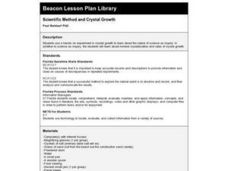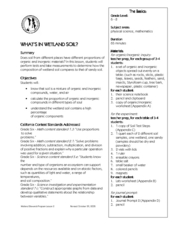Curated OER
How the Brain Learns
Students identify the basic function of the lobes in the brain. In this memory lesson students complete a lab activity on how fast they can react.
Curated OER
Scientific Method and Crystal Growth
Students conduct a hands-on experiment growing crystals to demonstrate the nature of science as inquiry. They discuss and test variables that affect crystal growth. They research mineral crystallization and mineral formation on the...
Curated OER
Sowing Seeds: the Beginning of the Fast Plant Life Cycle
Students plant seeds, observe and tend plants. They identify major plant parts, how to germinate and troubleshoot problems with plants; and, that plants need water, light, and soil nutrients to thrive. They create a Plant Growth Data Log.
Curated OER
Equations for Curves Passing through a Given Set of Points
Learner use three random locations on the coordinate system and simplify the expression and assign result to the variable loc. They substitute guesses for the center and radius of the circle in the equation for the center of a circle and...
Curated OER
Implicit Differentiation
Pupils explore the concept of derivatives. They use implicit differentiation to determine points on a graph where a tangent line is horizontal, vertical, or oblique. Finally, learners find the derivative of a polynomial by...
Curated OER
Geometry Standardized Test Practice
In this figures and graphs review activity, 10th graders solve and complete 23 various types of problems that include identifying various figures and graphs. First, they name the transformation that maps the unshaded figure or preimage...
Curated OER
Bellwork for Week 5-Minerals and Experimental Design
In this minerals and experimental design worksheet, students answer questions about variables in experiments, identification of minerals, mining and properties of minerals.
Curated OER
HW Unit 10:6-Standing Waves
In this standing waves worksheet, students answer 9 questions about graphs of various waves. They identify standing waves and their nodes, anti-nodes, wavelengths, amplitude, frequency and number of cycles.
Curated OER
HW Unit 10:2-Harmonic Motion
In this harmonic motion worksheet, students answer 9 questions about pendulums, a slinky and characteristics of harmonic motion. They identify the changes in waves as the amplitude gets bigger and interpret a graph of position vs. time.
Curated OER
Graphing at all Levels: It's a Beautiful Thing!
Mixing math and art is done in this lesson by applying graphing knowledge to create a unique piece of art. This lesson varies acording to the graphing knowledge of the artist. First, learners identify and review various types of graphing...
Curated OER
Himalayan Herds: Fractional Exponential Growth
Students solve problems by identifying exponential growth and decay and differentiating between patterns, relation and functions. In this algebra lesson, students apply concepts of exponential growth to solve problems.
Curated OER
Using Tables to Solve Linear Functions
Oh that intercept! Budding algebra masters solve linear equations from standard to intercept form. They identify the slope and y-intercept to help graph the lines, an then create coordinate pairs using a table of values. Great TI tips...
Curated OER
What's in Wetland Soil?
Students examine the organic and inorganic components of soil. For this environmental science lesson, students identify the factors that influence soil formation. They collect soil samples, conduct tests, and analyze the results.
Curated OER
Resistor and Resistance
High schoolers explore electrical resistance through various experiments. For this physics lesson, students calculate resistance using a mathematical formula. They explain how colors identify the resistance value of a resistor.
Curated OER
Cooking Up the Scientific Method
First graders identify the different steps of the scientific method. In this life science lesson, 1st graders apply this method when conducting a series of hands-on activities. They collect data and write observations in their journals.
Curated OER
Wave Math
Students identify the different factors affecting the size and shape of ocean waves. In this math instructional activity, students calculate wave speed and wavelength given a mathematical formula.
Curated OER
The Greenhouse Effect and Me: How Do We Affect Each Other?
Ninth graders create a model of greenhouse effect in the lab. In this integrated science lesson, 9th graders investigate the different variables affecting this condition. They research about global warming and prepare a PowerPoint...
Curated OER
Lesson 5: Designing an Experiment
The intent of this lesson is to introduce young scientists to the steps of the scientific method. To this end, they consider the question, "Which brand of battery lasts longest?" In this case, the experiment is carried out as a class,...
Curated OER
Like Terms
In this like terms worksheet, students solve and complete 10 problems and charts that include grouping various types of like terms. They identify each of the terms given and then group each one into the proper category on the chart shown.
Biology Junction
Scientific Method
Break down the scientific method to get a better grasp on the proper way to use it. A short presentation walks through each step in the scientific method and the proper vocabulary associated with each. Scholars complete the worksheet to...
Curated OER
Narrow Corridor
Buying a new sofa? Learn how to use the Pythagorean Theorem, as well as algebra and graphing techniques, to determine whether the sofa will fit around a corner (which I'm sure you'll agree is a very important consideration!).
Inside Mathematics
Graphs (2006)
When told to describe a line, do your pupils list its color, length, and which side is high or low? Use a worksheet that engages scholars to properly label line graphs. It then requests two applied reasoning answers.
Mathematics Assessment Project
Representing Functions of Everyday Situations
Functions help make the world make more sense. Individuals model real-world situations with functions. They match a variety of contexts to different function types to finish a helpful resource.
BW Walch
Solving Systems of Linear Inequalities
One thing that puzzles a lot of young algebrists is the factors in a word problem that are taken as "understood". This presentation on solving systems of linear inequalities does a great job walking the learner through how to tease those...

























